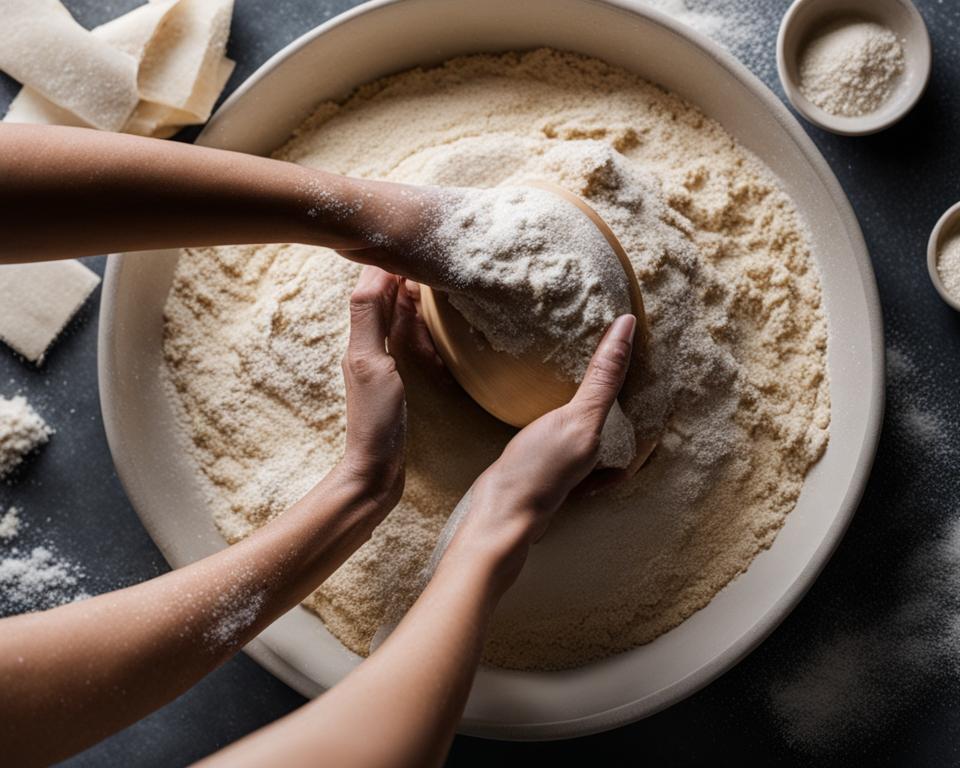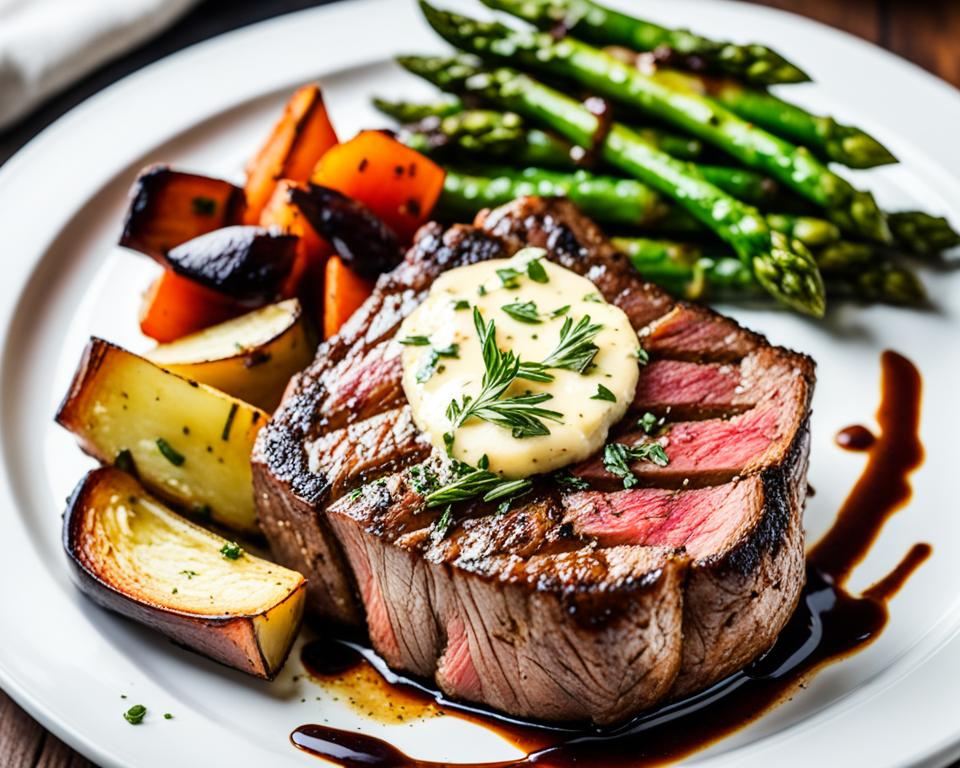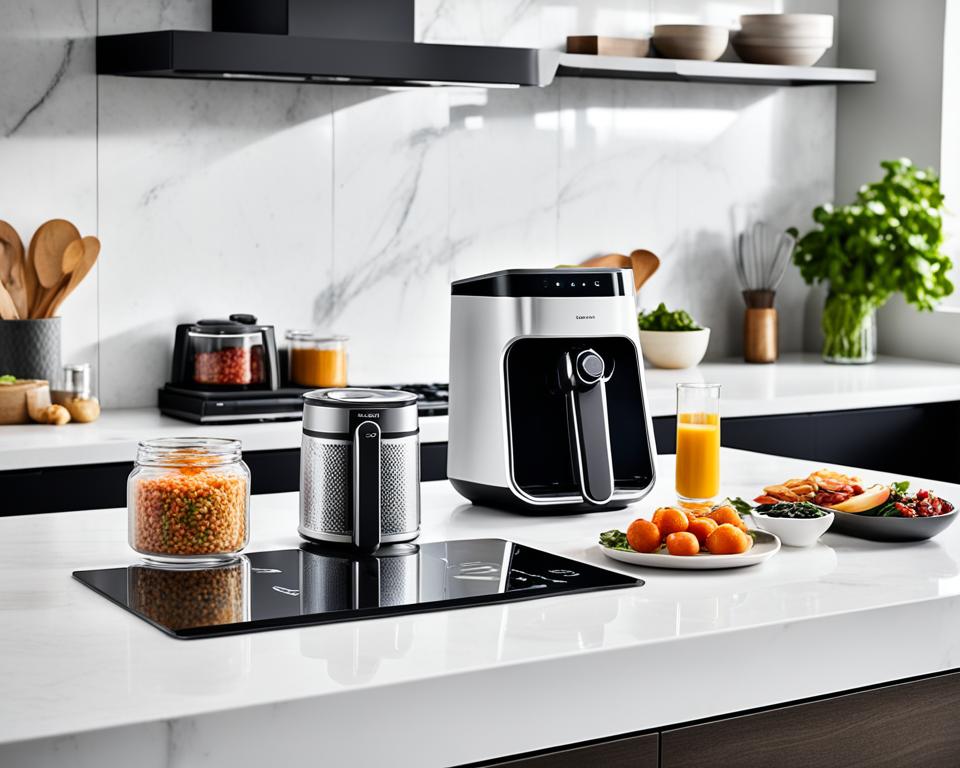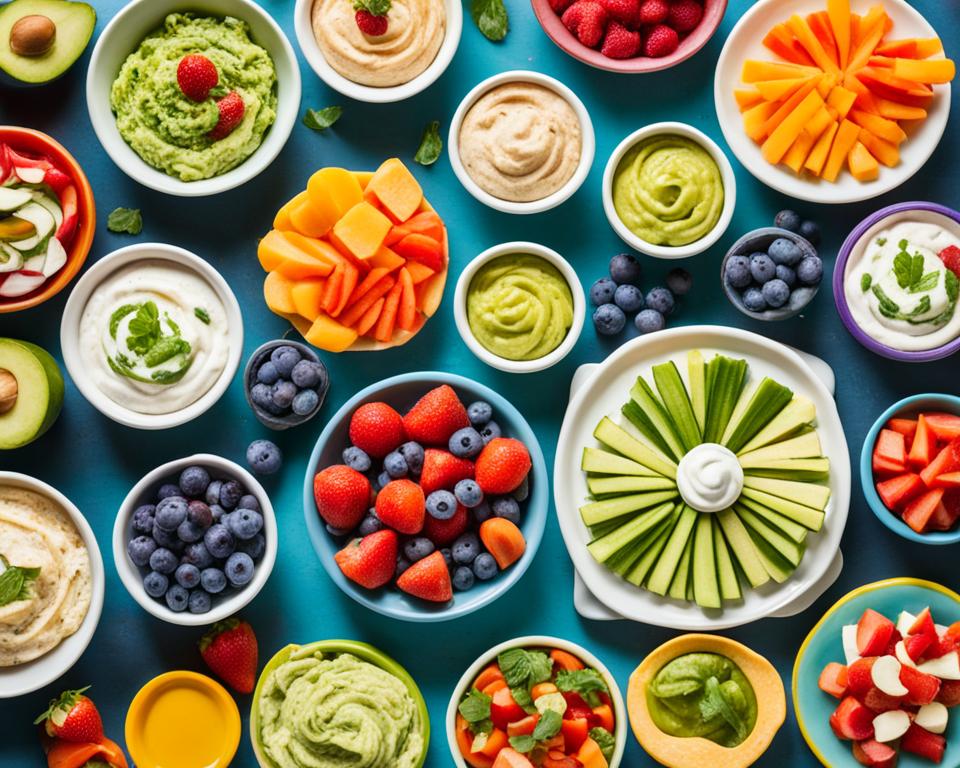Building a well-stocked pantry with homemade staples is a great way to save money on your grocery bill. By making our own bread, pasta, and other kitchen staples, we can cut costs and enjoy delicious homemade meals. In this article, we will explore the steps and ingredients needed to make these staples at home.
Key Takeaways:
- Homemade staples can help us save money on our grocery bill.
- Making our own bread, pasta, and other staples allows us to enjoy delicious homemade meals.
- Building a well-stocked pantry with essential ingredients is key to cooking from scratch.
- Taking advantage of sales and buying in bulk can help us save even more money on pantry staples.
- Having a variety of pasta, rice, oils, vinegars, baking ingredients, spices, and condiments in our pantry ensures versatility in our cooking.
Building up Your Pantry Staples
When cooking from scratch, it’s important to have a well-stocked pantry with essential staples. This will prevent the need for daily trips to the store and allow for efficient meal planning. While it may take some time and gradual purchasing to build up your pantry, it will ultimately save you money in the long run.
By keeping a variety of pantry staples on hand, you’ll have the necessary ingredients to create delicious and satisfying meals. Here are some essential items to include in your stocked pantry:
Spices
- Ground cinnamon
- Paprika
- Dried oregano
- Garlic powder
- Onion powder
- Salt
- Pepper
Oils
- Olive oil
- Vegetable oil
- Coconut oil
Grains
- Rice (white, brown, or basmati)
- Quinoa
- Whole wheat flour
- Oats
Baking Goods
- All-purpose flour
- Baking soda
- Baking powder
- Cocoa powder
- Vanilla extract
- Sugar (granulated and brown)
Having these pantry staples readily available will make meal preparation easier and more convenient. You can customize recipes, experiment with flavors, and enjoy the satisfaction of cooking from scratch. Plus, you’ll save money by not relying on pre-packaged convenience items.
Building a well-stocked pantry is an ongoing process. As you continue to cook from scratch, you’ll discover new ingredients and flavors to add to your collection. Don’t be afraid to try new recipes and expand your culinary horizons. With a fully stocked pantry, you’ll be well-equipped to create delicious meals for you and your loved ones.
Purchasing Your Ingredients
To save even more money on pantry staples, we recommend taking advantage of sales and bulk buying opportunities. By keeping an eye out for sales on items like spices, oils, and other cooking ingredients, you can stock up when they are available at discounted prices. Buying in bulk is also a cost-effective option, especially for ingredients that you frequently use in your kitchen.
When it comes to spices, buying in bulk allows you to get larger quantities at lower prices, ensuring that you never run out of your favorite flavors. Similarly, purchasing oils in bulk can save you money and ensure that you always have a variety of cooking oils on hand for different recipes.
In addition to spices and oils, buying ingredients in bulk can be a smart financial choice. Whether it’s canned goods, grains, or baking essentials, purchasing these items in larger quantities can help you save money in the long run. Plus, you’ll always be prepared to whip up a delicious meal or bake a tasty treat.
Remember to check the expiration dates and storage recommendations for bulk items to ensure they stay fresh and maintain their quality over time. With proper storage, your bulk purchases will continue to provide value and convenience for months to come.
So keep an eye out for sales, consider buying in bulk, and take advantage of opportunities to save money on your essential pantry ingredients. By strategically purchasing your ingredients, you’ll not only save money but also be well-prepared to create a wide variety of delicious dishes in your own kitchen.
Pasta and Rice
Pasta and rice are versatile staples that can be easily made at home. While homemade pasta is always a great option, it’s also convenient to have a variety of dried pasta on hand for quick and easy meals.
Some essential types of pasta to keep in your pantry include:
- Spaghetti
- Linguini
- Rotini
- Rigatoni
- Shells
- Egg noodles
- Tortellini
Rice is also a staple that can be used as a side dish or to stretch out a meal. Different types of rice to keep on hand include:
- White rice
- Brown rice
- Jasmine rice
- Basmati rice
- Long grain rice
Homemade Pasta Recipe
“Making your own pasta from scratch is a rewarding and delicious experience. Here’s a simple recipe to get you started:
- Combine 2 cups of all-purpose flour and 1 teaspoon of salt in a bowl.
- Create a well in the center of the flour mixture and add 3 large eggs, beaten.
- Slowly incorporate the flour into the eggs until a dough forms.
- Knead the dough on a lightly floured surface for about 10 minutes, or until smooth and elastic.
- Wrap the dough in plastic wrap and let it rest for 30 minutes.
- Roll out the dough using a pasta machine or a rolling pin until thin, then cut it into desired pasta shapes.
- Cook the homemade pasta in boiling salted water for 2-3 minutes or until al dente.
- Drain the pasta and serve it with your favorite sauce and toppings.”
| Type of Pasta | Description |
|---|---|
| Spaghetti | Long, thin cylindrical pasta |
| Linguini | Flat, narrow pasta |
| Rotini | Spiral-shaped pasta |
| Rigatoni | Tubular pasta with ridges |
| Shells | Shell-shaped pasta |
| Egg noodles | Flat ribbon-like pasta made with eggs |
| Tortellini | Small stuffed pasta rings |
Oils and Vinegars
Oils and vinegars are essential ingredients in cooking. Not only do they add flavor to dishes, but they also serve various purposes in our culinary pursuits. Let’s explore the diversity of oils and vinegars that can elevate your cooking and take it to new heights.
1. Variety of Oils
The world of oils offers a wide range of flavors and benefits. Here are some popular choices:
| Type of Oil | Primary Use |
|---|---|
| Coconut Oil | Great for high-heat cooking and baking |
| Vegetable Oil | Ideal for frying and sautéing |
| Corn Oil | Suitable for grilling and deep-frying |
| Olive Oil | A versatile oil for cooking, dressings, and marinades |
| Grapeseed Oil | Excellent for salads, stir-frying, and baking |
Each oil brings its own unique flavor profile and smoke point to enhance your dishes. Experiment with different oils to find the perfect match for your culinary creations.
2. Versatile Vinegars
Vinegar adds acidity and tang to recipes, making it an indispensable ingredient in various cuisines. Explore the following vinegars and their applications:
| Type of Vinegar | Primary Use |
|---|---|
| White Distilled Vinegar | A multi-purpose vinegar for cooking, pickling, and cleaning |
| Apple Cider Vinegar | Popular for dressings, marinades, and health tonics |
| Balsamic Vinegar | A rich and sweet vinegar for salads, glazes, and desserts |
| White Wine Vinegar | Perfect for light and tangy dressings, sauces, and vinaigrettes |
| Red Wine Vinegar | Complements hearty dishes, dressings, and marinades |
With this assortment of vinegars, you can enrich your culinary repertoire and transform ordinary recipes into extraordinary delights.
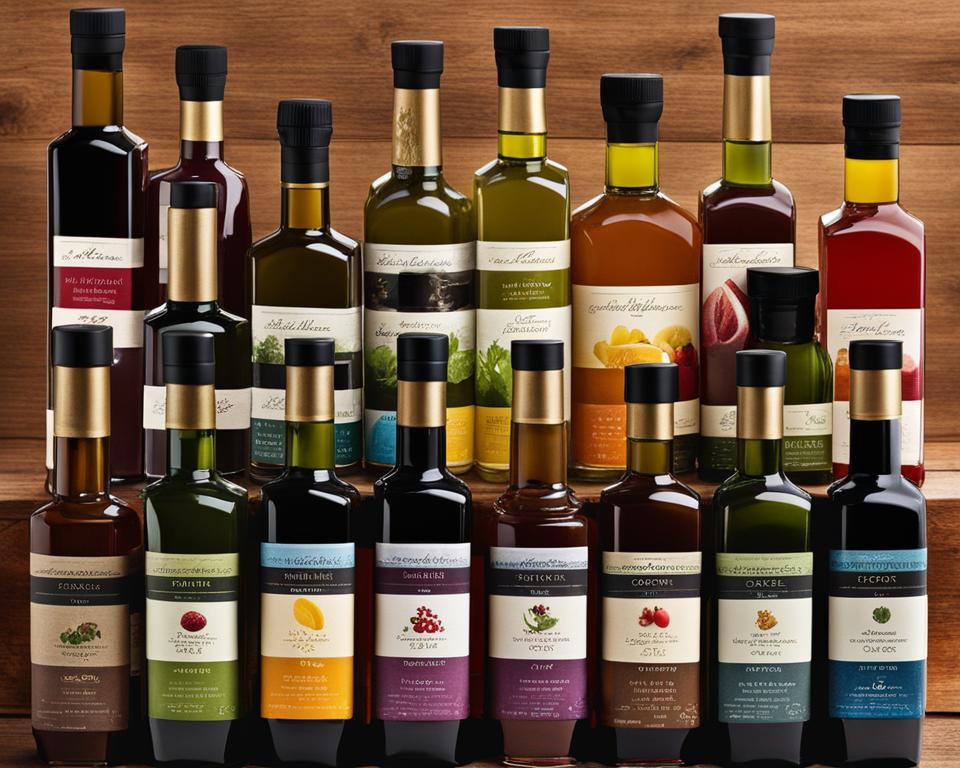
Oils and vinegars are not only kitchen essentials but also versatile ingredients that can be used beyond cooking. From salad dressings and marinades to homemade cleaning solutions and personal care products, they serve a multitude of purposes.
Having a variety of oils and vinegars at hand empowers you to be more creative in the kitchen. So, stock up on coconut oil, vegetable oil, corn oil, olive oil, grapeseed oil, white distilled vinegar, apple cider vinegar, balsamic vinegar, white wine vinegar, and red wine vinegar. These flavorful ingredients will elevate your dishes and open up a world of culinary possibilities.
Baking Ingredients
When it comes to baking, having a well-stocked pantry with essential ingredients is key. Whether you’re making a batch of cookies, a loaf of bread, or a decadent cake, having the right baking ingredients on hand will ensure your creations turn out perfectly every time.
Here are some of the must-have baking ingredients that you should always have in your pantry:
- Flour: Whether you prefer all-purpose flour, whole wheat flour, or specialty flours like almond or coconut, having flour is essential for most baking recipes.
- Baking soda: This leavening agent helps your baked goods rise and gives them a light and fluffy texture.
- Baking powder: Similar to baking soda, baking powder is also a leavening agent that helps your baked goods rise. It’s often used in recipes that don’t contain acidic ingredients.
- Cocoa powder: Perfect for making chocolate desserts, cocoa powder adds a rich and chocolatey flavor to your baked treats.
- Vanilla extract: A staple in almost every sweet recipe, vanilla extract adds a warm and inviting flavor to your baked goods.
- Cornmeal: Used in a variety of baked goods, cornmeal adds texture and a slightly sweet flavor.
- Bread yeast: Essential for making bread, bread yeast helps dough rise and gives bread its light and airy texture.
- Powdered milk: Often used in baking recipes, powdered milk adds richness and flavor to your baked goods.
- Condensed milk: A sweet ingredient commonly used in desserts, condensed milk adds a creamy and indulgent touch to your recipes.
- Evaporated milk: Similar to condensed milk, evaporated milk is often used in creamy custards and puddings.
- Cornstarch: This pantry staple is commonly used as a thickening agent in sauces, fillings, and custards.
Having these baking ingredients in your pantry will set you up for baking success. Not only will you be able to create a wide variety of delicious baked goods, but you’ll also save money by having these staples on hand instead of purchasing them individually for each recipe.
With a well-stocked pantry of baking ingredients, you’ll be ready to whip up delectable treats whenever the mood strikes. So roll up your sleeves, preheat that oven, and get ready to create mouthwatering desserts that will impress your family and friends!
Spices and Condiments
In our quest to create delicious meals, spices and condiments play a vital role. They add flavor and variety to our dishes, elevating them from ordinary to extraordinary. Having a well-stocked pantry with essential spices and condiments is key to achieving culinary success.
When it comes to spices, there are a few must-haves that no kitchen should be without. Dried basil, dried oregano, garlic powder, onion powder, pepper, salt, thyme, sage, parsley, cinnamon, cayenne pepper, paprika, crushed red pepper, cumin, rosemary, and nutmeg are all essential spices to keep on hand. These versatile ingredients can be used in a wide range of recipes, from soups and stews to marinades and rubs.
Condiments are another important component of a well-rounded pantry. Ketchup, mayonnaise, mustard, soy sauce, lemon juice, and Worcestershire sauce are all staples that add tang, creaminess, and complexity to our dishes. Whether you’re grilling burgers, making a salad dressing, or marinating meat, these condiments are there to enhance the overall flavor.
By keeping a variety of spices and condiments in your pantry, you’ll have the tools to create unforgettable meals. Experiment with different combinations and flavors to find your signature style. So, let’s spice things up and take our cooking to the next level!
FAQ
How can I make my own bread, pasta, or other staples to save money?
Making your own bread, pasta, and other kitchen staples is a cost-effective way to save money on your grocery bill. By making these staples at home, you can avoid the higher prices of store-bought options and enjoy delicious homemade meals. Plus, the ingredients needed are often pantry staples themselves, making it convenient and budget-friendly.
What are some essential pantry staples for cooking from scratch?
Essential pantry staples for cooking from scratch include spices, oils, grains, and baking goods. These items are versatile and can be used in a wide variety of recipes. By keeping a well-stocked pantry, you can avoid frequent trips to the store and efficiently plan your meals.
How can I save money on pantry staples?
To save money on pantry staples, take advantage of sales and bulk buying opportunities. Look for sales on items like spices, oils, and other cooking ingredients, and stock up when they are on sale. Buying in bulk is also a cost-effective option, especially for ingredients that you use frequently. This will help you save money in the long run and ensure you always have essential staples on hand.
What types of pasta and rice should I keep in my pantry?
It’s convenient to have a variety of pasta options in your pantry, both homemade and dried. Some essential types of pasta to keep on hand include spaghetti, linguini, rotini, rigatoni, shells, egg noodles, and tortellini. Rice is another versatile staple that can be used as a side dish or to stretch out a meal. Different types of rice to keep in your pantry include white rice, brown rice, jasmine rice, basmati rice, and long grain rice.
What oils and vinegars should I have in my pantry?
Oils and vinegars are essential ingredients in cooking. A variety of oils can be used for different purposes, such as coconut oil, vegetable oil, corn oil, olive oil, and grapeseed oil. These oils can be used in cooking as well as in making personal products. Vinegar is another versatile ingredient that can be used for cooking, cleaning, and personal products. Some essential vinegars to have on hand include white distilled vinegar, apple cider vinegar, balsamic vinegar, white wine vinegar, and red wine vinegar.
What are some essential baking ingredients to have in my pantry?
Essential baking ingredients include flour, baking soda, baking powder, cocoa powder, vanilla extract, cornmeal, bread yeast, powdered milk, condensed milk, evaporated milk, and cornstarch. These ingredients are used in a variety of baked goods and can be easily purchased in bulk to save money. With these staples on hand, you can whip up delicious homemade breads, cakes, cookies, and more.
What are some essential spices and condiments to keep in my pantry?
Spices and condiments add flavor and variety to meals. Essential spices to keep in your pantry include dried basil, dried oregano, garlic powder, onion powder, pepper, salt, thyme, sage, parsley, cinnamon, cayenne pepper, paprika, crushed red pepper, cumin, rosemary, and nutmeg. Condiments such as ketchup, mayonnaise, mustard, soy sauce, lemon juice, and Worcestershire sauce are also important to have on hand for added flavor. With these pantry staples, you can elevate the taste of your dishes and experiment with different flavors.

